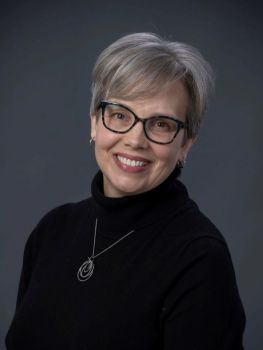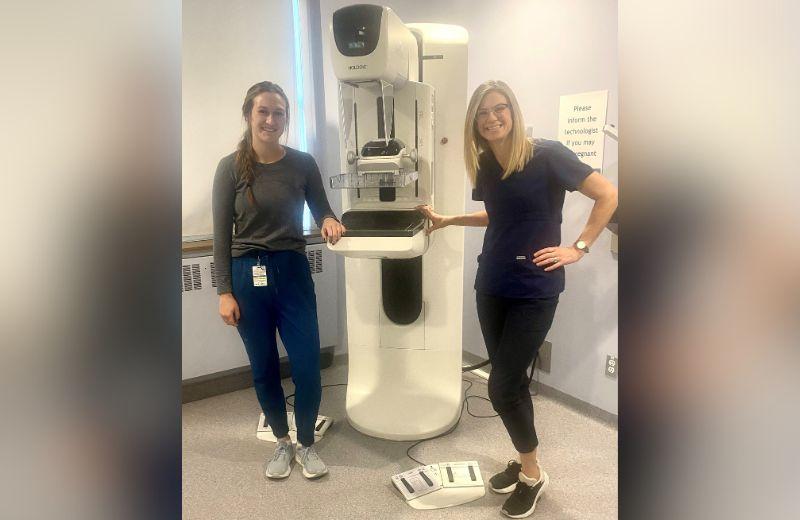October was Breast Cancer Awareness Month, a time we dedicate annually to bringing awareness to the supports available to prevent, detect, and treat breast cancer in Northern BC. However, this work continues all year, long after the awareness month is over, as patients continue to be screened and treated for the disease. While one in eight women in Canada will be diagnosed with breast cancer in their lifetime, early detection and diagnosis have been shown to reduce mortality and the levels of treatment needed.
Mammograms are a key screening tool in the detection and prevention of breast cancer. According to the Canadian Cancer Society, there are two kinds of mammograms, each done for different reasons. In both cases, the breast tissue is compressed (flattened) between two clear plates, and X-ray images of the tissue are taken for analysis by a radiologist.
- Diagnostic mammograms are done to diagnose a problem, such as a lump or something concerning found in a physical exam. They capture detailed images from multiple angles and focus on a specific area of concern.
- Screening mammograms are used to look for cancer in patients who don’t have any symptoms or problems. They monitor changes in the breast tissue over time and can detect cancer at early stages.
I sat down with Dr. Karen Seland, a radiologist at the University Hospital of Northern BC in Prince George, to talk all things mammograms and the importance of screening mammography.

Family history or not, get screened!
Breast cancer is an issue near and dear to Dr. Seland’s heart. Her mother, who was a nurse, was diagnosed with breast cancer in her forties. Dr. Seland works to support better access to screening for women 40 and older, and to remind them that even without a family history, breast cancer is possible.
“What saddens me is the number of delayed diagnoses, because women don’t think it could be cancer, because there isn’t a family history,” says Dr. Seland. In fact, 75-80% of those diagnosed with breast cancer don’t have a family history of a first-degree relative with breast cancer, so everyone should be screened once they’re eligible.
“In BC you can start screening at age 40,” says Dr. Seland, “and if there’s a family history of a first-degree relative (e.g., mother, sister), you can repeat screening annually. Without a family history, it’s every two years.”
Mammogram hesitancy?
There are many reasons why someone might put off getting a screening mammogram. Anxiety and concerns about pain from the test itself, the inconvenience of booking medical tests, exposure to radiation, and fear about outcomes are commonly mentioned. Dr. Seland noted how surprised many women are when they do finally come in for a mammogram and see how much better an experience it was than they were expecting -- quicker, easier, and less painful. “Many women end up kicking themselves for waiting,” she said.
While pain or discomfort from the compression is possible, the technologists do their best to minimize this.
“We have an amazing team of technologists who are extremely skilled and work with you to make the experience as positive and comfortable as possible,” says Dr. Seland. “Most women categorize the pain as minimal to moderate, and 94% of women indicate that they would have one again despite the discomfort.” She offers one tip to minimize pain: “Consider scheduling your mammogram for after your menstrual cycle, so your breasts are less tender.”
Mammograms can be performed on all breast sizes, and they can accommodate people with mobility issues as well. People with breast implants can also get screening mammograms; however, they need a referral from a care provider.
Radiation exposure should not deter women from booking a screening mammogram. Mammography uses very low-dose X-rays (the lowest possible amount to get the images needed), and newer technologies have reduced the risk even further. Overall, the benefits to getting a screening mammogram outweigh the risk posed by the small amount of radiation you’re exposed to.
Why are screening mammograms so important?
When caught at an earlier stage, breast cancer has a 98-100% survival rate. In fact, patients having regular mammograms have at least a 25% smaller chance of dying from breast cancer. Screening mammography not only detects cancers earlier in their development, but also detects certain types of cancers that can’t be seen with ultrasound or felt during a manual breast exam.
"Mammograms detect cancers often two to three years prior to being able to be felt by an individual or a primary care provider,” says Dr. Seland, “and the earlier we detect it, the higher the rate of survival, and often less extensive treatment is required.”
What to expect after your screening mammogram
Once a screening mammogram has been performed, you’ll be sent home and can expect to receive your results in the mail in two to three weeks. If any abnormalities are detected, you’ll receive a phone call directly. However, a phone call doesn’t necessarily mean bad news, just that more information is needed. Dr. Seland notes that this isn’t unusual and shouldn’t cause worry: “One in ten patients will be called for additional imaging, and a small percentage will be asked to come back in six months for another screening. An even smaller amount will be asked to have a biopsy.”
“If you notice something in between screening mammograms, bring it to the attention of a care provider and come in if something changes, even if you’ve had a recent normal screening mammogram,” she says.
What are you waiting for?
If you’ve been thinking about booking a screening mammogram, then make today the day! Women over the age of 40 can book their own screening mammograms without a referral or a primary care provider. Visit the BC Cancer clinic locator to find a centre near you, and call 1-800-663-9203 book your appointment today.














Comments